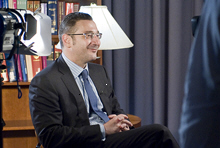
Typical street scene in Santa Ana, El Salvador. (Photo: iStock)
IMF Survey: Putting Georgia on a Path to Recovery
October 21, 2008
- IMF loan will help bolster Georgia after conflict
- Georgia's external financing needs assessed at roughly $3.2 billion
- Key task will be to restore investor confidence in Georgia
Georgia has built an impressive record of economic growth and reform in recent years. But following the August 2008 armed conflict, the country must now rebuild its economy and bolster investor confidence.

Lado Gurgenidze: "Georgia needs to stay its course, focusing on economic development and on radical reforms." (photo: IMF/Padraic Hughes
LADO GURGENIDZE
In a video interview with IMF Survey magazine, Georgian Prime Minister Lado Gurgenidze talks about the impact of the armed conflict, the need for financial support, and how his country aims to continue the reforms that transformed Georgia's economy into one of the world's most dynamic performers.
IMF Survey online: Your country recently agreed on a $750 million Stand-By Arrangement with the IMF. What are Georgia's greatest needs following the conflict?
Gurgenidze: Well, first I want to compliment the IMF staff on the speed with which they worked on this program. We have been very pleased with the outcome. It was put in place over a three-week period and announced in early September, which was crucial from the point of view of establishing a positive news flow at a very important and sensitive time for Georgia.
We clearly have issues related to the recovery of the direct civilian damage. Unfortunately, this conflict has left us with a large number of internally displaced persons, of whom roughly 30,000 are displaced on a long-term basis. We need to resettle them, give them livelihoods, rehabilitate the damaged areas—this costs a lot of money, the kind of money we, on our own, cannot afford, hence the donor conference that has been called for October 22. We clearly at this point need budget support, and some of the donor money has been earmarked for that—especially from the United States. That is existentially important, and we are grateful for that.
Looking ahead, we will need to address the infrastructure chokepoints, and pay particular attention to transports and energy security. Overall, while our banking system is healthy, well-capitalized, and liquid, we need to help it to the extent we can to keep lending aggressively to the economy, because that will be what eventually puts us on the path to recovery and will allow us to regain the very high growth trajectory that we've been enjoying for the past few years, during which we have grown at the rate of 10 percent or greater.
IMF Survey online: How much money, in addition to the IMF loan, will Georgia need?
Gurgenidze: The United States has pledged $1 billion, and has done so quite early. The European Commission has indicated the amount of 500 million euros. What we will find out in the coming days is whether some donor countries, on a bilateral basis, are prepared to pledge additional amounts. The needs assessment—a coordinated exercise of the World Bank, the United Nations, the European Commission, the Asian Development Bank, and others—has been carried out, and it establishes the overall need for roughly $3.2 billion, of which we currently have seen pledges or indications of about $1.8 billion. So we still need to cover some distance, but I believe we will get there, and we are grateful for the strong support from the multilateral institutions, Europe, the United States, and other countries.
IMF Survey online: How is the IMF loan being used?
Gurgenidze: The IMF loan is a stand-by facility, of which we have drawn down $250 million. That sum has gone to increase the central bank's reserves at this time of global uncertainty. That is the purpose of the loan, and clearly it will not find its way into the budget or into the real sector of the economy, but it will certainly help us augment the financial stability that we have been enjoying for so many years.
IMF Survey online: What will be needed to restore investor confidence in Georgia?
Gurgenidze: Investor confidence has certainly been very high over the past few years. Georgia has been enormously successful in attracting foreign investment inflows. Last year alone, the private capital inflows into Georgia were $2.3 billion, or roughly 23 percent of GDP. In the first half of this year, private capital inflows amounted to $1.7 billion, even accelerating from that already high level.
Looking ahead, the events of the past few weeks have overtaken any other factor. But it appears to me that we have turned the corner in terms of avoiding any global financial meltdown, and things will improve over time. Georgia needs to stay its course, focusing on economic development and on radical reforms that have made us over the past few years one of the freest economies in the world and one of the most dynamic performers. The rest will all come with time.
IMF Survey online: Are you concerned about the effects of the financial crisis?
Gurgenidze: Well, indirectly, of course, we will feel it, because its aftermath and its fallout will have an impact on the investors, reducing their capability or appetite for investing overall, not just in Georgia. So we will have to work through this rather difficult period while there is still some negativity in the system, although I believe we have turned the corner globally.
Comments on this article should be sent to imfsurvey@imf.org


